- Home
- J. Naomi Ay
A Thread of Time: Firesetter, Book 1 Page 2
A Thread of Time: Firesetter, Book 1 Read online
Page 2
“I didn’t…” he began, his small feet trailing after mine, two of his steps equaling every one I placed.
“Do you know how many orphaned waifs come to our house everyday?” I demanded, not slowing pace, nor daring to look back, and not wanting or expecting an answer to my question. That would only encourage him. If he saw a hint of pity in my eyes, he would think he had won, when in truth, my mother’s reaction to his presence would only result in a tongue lashing for me. “Go away. You can’t come with me. My mother will set the dog on you if you dare approach our door.”
The boy continued to follow me, either pretending he hadn’t heard, or didn’t believe me, in which case, he would have been correct. We had no dog. However, my mother always threatened it, even if she had to fake a vicious growling or barking sound herself. Sometimes, I faked the barking, although my rendition sounded more like a cow. Still, it managed to rid our porch of wayward orphans and other people of the street.
“Like ants they are,” my mother said. “Give one a crumb and in minutes, the entire colony will appear.”
“What’s your name?” the child asked, still following me, pestering me. “Mine is Dov. I can spell it, D-O-V.”
I don’t know why, but I stopped short right then, causing the boy to bump into my back.
“Dov?” I gasped. “How does a street urchin know how to spell?”
“I don’t know,” the boy shrugged. “I just do.” Again, those red shoulders shifted up and down. He blinked rapidly, his lips forcing a tiny smile again. “Tell me your name so we can be friends.”
“I don’t want to be your friend.” Immediately, I was filled with remorse for speaking so harshly to this poor lonely child.
The rain was coming hard then and I was growing wet and cold. I longed to return home, to the warm fire in our hearth and hopefully, the remains of a hot cabbage soup, the last from my mother’s kitchen garden.
“I mean,” I continued, doing my best to explain in a way the young child would understand. “I am much older than you. It wouldn’t be right. Now, for the last time, go on. Go away. I don’t want you following me, and I can’t give you anything or help you, in any case. Goodbye Dov.” I waggled a finger at the road, before putting my fists on my hips and tapping my foot with impatience.
“But, I don’t want your help,” the boy insisted, refusing to acknowledge my dismissal, while the rain showered us from above. His wild curls became twisted ropes, and his thin, torn clothing clung to his tiny body.
“Then, what do you want from me?”
I never heard his answer. Lightning crackled and flashed directly over our heads, sending us scurrying into the doorway of the nearby abandoned building. We were lucky we had done so, for only a moment later, the ground rumbled with a sound akin to thunder as heavy trucks rolled down the road.
“It’s them,” I gasped, instinctively reaching for Dov’s arm. Whether I did this to shelter him or protect myself, I wasn’t certain. In any case, I pulled him down, the two of us squeezing into the furthest, darkest corner, cowering against the cracked glass door, hiding our faces and our hair beneath our arms. “Don’t let them see us.”
Dov didn’t move. As far as I could tell, he never even breathed. For what seemed like the longest minute in my life, the two of us didn’t exist.
Somewhere, further down the road, in the direction of the village market, I thought I heard screaming although it could have been the wind and rain. Somewhere, further down the road, I thought I heard the sound of gunshots, although it could have been the lightning, or the crackling of the fire as another abandoned building burst into flame.
Chapter 3
Ailana
On Saturdays, when I was a young woman, I helped my grandmother at her shop. She was a seamstress who spent her days tucking in or taking out, sewing buttons or hems, and occasionally, creating something all new from scratch. Sometimes, that something would be for me, even though most often, I didn't want it.
I didn’t like my grandmother’s creations then, and I didn’t like having to sit next to her and sew stitches myself. I hadn’t the patience to do such work and despite my best efforts, I generated only poor, pale copies of her handiwork.
Furthermore, Saturday was the best day of the week when all the other young people of our village would be resting or enjoying themselves instead of toiling. Yet, there I was, trapped in a dark and musty shop, next to an old, foul-mouthed woman who spent the entire time chiding my lackluster efforts.
“Not like that, Ailana,” she’d snap, and in a swift swipe of a seam ripper, tear out everything I had just done. “You’ll never get a job as a seamstress with such sloppy stitches.”
“I don’t want a job as a seamstress,” I would retort, raising my chin, and thinking myself ever so clever.
“Too fine for such work, are you? Then, you shan’t have this new dress. You are undeserving.” She would hold up the golden gown with the handmade lace collar she had been tatting. “I shall have to give this to your cousin, Embo although she looks exactly like her mother, far too thin to fit it well, and with nothing to fill it up.”
“Fine. Give it to her.”
“Fine. I shall.”
With the issue of the dress decided, I rethreaded my needle and attempted to hem the customer’s skirt once again. It was a black sateen fabric that showed every misplaced needle-prick, too difficult a task for a novice such as me. Surely, my cousin Embo would have done a far better job. She always did, and Grandmother made certain I knew that.
“Your cousin will look like a shiny stick in this.” Grandmother sniffed and sigh dramatically. “No amount of lace will make her appealing to a man. She’s as plain and ordinary as a blank page, and this gold color will be dreadful with her pale skin, although I must say, she would do a much better job on that skirt than you.”
“And, where is she today? Why isn't my cousin here suffering with me?”
“She is out looking for a man, no doubt, and having little luck in finding him.”
Grandmother would snicker then, and I would do my best not to follow suit. I liked Embo well enough, although I tended to agree with Grandmother's assessment.
“You, on the other hand,” Grandmother continued, “Would look lovely in this color, for your hair and complexion is the same as this gold thread. Your face and especially, your smile would light it as if it was touched by a single ray from the sun. But, you are a spoiled rotten child, and undeserving of such a treasure. You also do not need it, for you can catch a man with just your face. Make your back stitch tighter, Ailana, or the hem will quickly pull out. Place it closer to the fabric's edge, else your stitches will show upon the skirt's face.”
“Yes, Grandmother.” I would sigh dramatically, too, and while tightening my back stitch, I’d avoid glancing in the direction of the golden dress.
I didn’t want it anyway. It wasn’t as if I was about to be invited to a palace ball. In this poor village full of those just like ourselves, it would look completely out of place.
“I once made this same dress for the little princess, Prince Mikal’s daughter, although that one had pearl buttons all the way down the bodice here, instead of these plain gilt. Ach, the pearls were so much nicer. Did you know the Empress Sara had the exact same gown, and insisted her granddaughter’s would match it in every detail?”
I did know about that dress, for I had heard this story many times before. During the old Empress's reign, Grandmother's shop was designated as an Official Dressmaker and a Royal Seal was placed upon the door. It was the only one so honored in our village, a tiny corner of the port city of Farku on the west coast of the continent that was called Mishnah. This was long ago, several decades past, although it felt like centuries to me.
I was born just before the Empress died, right before the beginning of King Mikal’s reign and the outbreak of the Disease, which killed my parents and many others including the young princess and the Queen.
“How would you like to be dress
ed as a copy of me?” Grandmother asked, again holding up the dress for me to appreciate.
“I would hate it,” I replied without hesitation.
“As would I,” Grandmother agreed. “I am far more beautiful than you. I would feel great sorrow eclipsing your attention by my fair grace.”
Invariably, that comment, which happened one or more times every Saturday, would cause me to erupt into laughter, while Grandmother did her best not to display her own mirth. Though Grandmother was probably only in her sixties, she was old to a girl my age, her skin wrinkled, her hair coarse and white, her hands freckled with spots.
I realized later, she was still quite beautiful for both her own age and any other, but to the child that was me, she simply could not compare to my youthful splendor.
“The Empress, the elder Sara, was more beautiful than the younger too. The little girl took after her grandfather, the Duke, and while a fine gentleman, and a genuinely kind man, His Royal Highness’s looks were considerably lacking.”
Grandmother’s eyes grew misty as they did every time she thought of her youth.
“It was a different world then. So much hope, so much to look forward to. Ach, not at all like it is now.”
Despite her distant thoughts, her fingers never once stopped their ministrations, nor ever lost a stitch, for she could sew with the same perfection with eyes closed.
“And, how did the little princess like the dress?” I asked. “Was it a success?” Having finished my tasked of hemming a skirt, I rose to take it to the iron.
“Let me see what you have done,” Grandmother called sternly, not responding to my question. “Fine. Not your best work, but good enough for this lady. You’ll be able to earn a coin or two from your skills if you keep it up. If you concentrate better, Ailana, you might even earn three or four. A good seamstress is always in demand by the nobility and rich.”
“What nobility and rich?” I scoffed. “They are as poor as we are now.”
“Anyone who has three coins to pay me is rich in my book,” Grandmother snorted.
Turning on the steam, I carefully pressed out the skirt by placing it between two layers of special pressing cloth. As I stood there performing this laborious and boring task, I dreamed of future days in the university, surrounding myself with art and music, while discussing theories and philosophies with learned professors and brilliant students. We would sip dark espresso and think great thoughts, while planning how we would save our world and bring equality to all the races.
“That’s all well and good, Ailana,” Grandmother would say. “But, if you are not admitted into your fancy university, you best have a fallback plan to feed yourself.”
I had no retort for this. I would be admitted of course. I was saving my money. I could earn a scholarship if I had to.
“It's not the money,” Grandmother would cackle. “It never was. It's who you are and where your people are from. Heed my advice for I have seen it happen more times than I care to recall. It’s the way of things. The pendulum swings both back and forth. Trust me. It is about to swing again.”
“It’s a new century,” I replied. “We won’t make the mistakes of your generation.”
“It was a new century then, too, and we said the same.”
“King Mikal has everything under control.”
“He is a sad man, scarred by the Disease, and his own woes. The loss of his beloved wife and his little princess makes him long for the eternal rest. I fear our next king shall be his distant cousin, Duke Marko Korelesk and that does not bode well for our people, those who came from the motherland of Karupatani. Weak men always look for another to blame, and the Duke is both weak and dislikes our kind.”
“I am not afraid,” I replied smugly, placing the skirt upon a hanger, and covering it with a sheet of thin plastic wrap. “There is a movement afoot to elect a president instead of a king. We shall select someone smarter, someone caring who can represent us all. After Mikal, we shall be finished with the reign of kings and queens.”
Grandmother hated it when I argued for democracy. Like her ire, the color rose in her face.
“People are stupid,” she snapped, impatiently. “Too stupid to elect anyone who won’t proclaim himself exactly that. Go on with you now, Miss University Girl. Go study your philosophy, but take a look at history too. When you are hungry, recall how to earn a coin by placing a stitch. It will feed you more than any art or music theories can provide.”
“That will never happen,” I retorted, already half way out her door.
“Of course it will. You just wait and see, for again it shall be us that are called to blame. Again, it shall be us who will become unwelcome in our homes. For this time, our motherland awaits. The Great Emperor granted it to us for all perpetuity. He knew two hundred years ago that this time would come to pass again.”
I must have responded smartly. I always did. At the very least, I would have let the door slam shut behind me, as I hurried out, making an attempt to salvage the afternoon. I wouldn’t let Grandmother's predictions bother me, for I heard the same every Saturday, and ignored them every time.
The motherland, the old ways held no attraction when the future beckoned. Frankly, only my grandmother belonged there, where they still practiced the Old Religion and kept the laws in those silly ancient books. To do this day, nearly two centuries since the Great Emperor had ended the wars and combined the races, only she still insisted we were of one and not the other.
But, I was the ignorant one, for time happened exactly as my grandmother foresaw. After King Mikal’s death a dozen years into the future, while I was still a young mother, Grandmother’s prophetic words unfortunately came true.
Chapter 4
Lance
My first year in the Allied SpaceForce aboard the Starship S/S Tornado was fairly uneventful if you consider spending six months of it in the sickbay stuck in a bed. I was waylaid fairly quickly by an attack of the space sickness which left most of my muscles unable to move. The only muscles that responded to any stimuli from my brain were those in my face, my heart and lungs, and the ones controlling my left pinkie finger. Unfortunately, while these muscles generally worked, there were times when even they simply chose to go to sleep, leaving me as productive as a zucchini on a stretcher.
“It’s because of your previous nerve injuries,” the ship’s doc decided after studying the monitor above my head even though it always showed the same numbers and lines. “You were never fully recovered from that. You should have been screened out of space duty at your intake physical. You should have been assigned to guarding the fence at a landbase back on Earth.”
I would have responded, if I could have. I would have told him about my galaxy-wide quest and shown him the ancient coin from the distant empire, but that moment was one of those times when my mouth randomly chose not to work. In fact, instead of talking I went into a coma-like state.
“Ah well, you’re here now and we’ll have to deal with it.” The doc sighed, doing his best to return me to consciousness.
When I was alive again, but just barely, the doc summoned a nurse to my side.
“Nurse Moosy, this spaceman is your sole responsibility. Consider him your personal patient. See that he’s well taken care of, and maybe, he’ll survive so we can kick him out of SpaceForce.”
Nurse Moosy nearly killed me, while at the same time, she was the only reason I was determined to make it through. This was because each morning, I awoke to the vision of her three, blue-skinned boobs hovering over my face.
She didn’t do this on purpose, or so I thought. It was just the way she adjusted my meds, or took the readings from the monitor over my head. Each morning this alone caused my reluctant heart to jolt into action, which was followed only minutes later by a full cardiac arrest.
My heart wasn’t the only organ that enjoyed her attention. When she changed my bedding or adjusted my catheter, other dormant parts of my body rose from the dead.
Nurse Moosy would
giggle and blush, her pale blue face turning a shade of lavender with scattered lilac splotches, something I found incredibly attractive.
“Naughty spaceman,” she’d say and waggle a finger in my direction.
“Mrr murf hamum,” or something like that, I’d usually respond.
After several weeks in a nearly vegetative state, enjoying Nurse Moosy’s attention from only inside my head, my body began to awaken and recover.
“Marry me,” I declared to Nurse Moosy as she studied my blood pressure on the first morning when I could speak.
“Silly spaceman,” she replied. “I don’t know you well enough yet.”
“You know every inch of my body and then some.”
“I will go on a date when you are no longer my patient.”
“Mrr murf hamum,” or something like that, I mumbled, as she had stuck a probe in my mouth.
I reported back to duty and returned to my quarters, a tiny bunk in an even tinier cabin shared with three other guys. Borf was an enormous Andorian, who took up twice as much space as my other roommates, Wen and Noodnick. Noodnick definitely wasn't human, but what he was, I hadn’t a clue, and frankly, wasn’t too keen on finding out.
“You’re back,” Wen proclaimed, greeting me with a sort-of hug, even though I had met him only once before on the day I had come aboard. Wen had said he was human, and granted he looked like it, but there was something off about him, too, something that made me think he was also something else. “You are recovered, Lancelot?”
“It’s just Lance, and yes, thanks for asking.”
“Shut up!” Borf roared. “I’m trying to sleep.”
Noodnick didn’t say anything, which I guess was par for the course. According to Wen, the dude never spoke, or if he did, it wasn’t audible to our ears.
My first day back on duty, I was assigned to a place we affectionately referred to as the engineering dungeon. There, I was given a console to monitor. Basically, I was to stand for eight hours and look at lights and gauges: oil pressure, water temperature, voltage, hydraulic pressure, engine temperature, hynautic pressure, and about forty other dials. If any one of them turned red, if a claxon sounded, or if I smelled smoke, I was to push another set of buttons and immediately inform the bridge.

_preview.jpg) The Boy who Lit up the Sky (The Two Moons of Rehnor, Book 1)
The Boy who Lit up the Sky (The Two Moons of Rehnor, Book 1)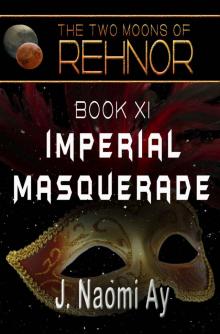 Imperial Masquerade (The Two Moons of Rehnor, Book 11)
Imperial Masquerade (The Two Moons of Rehnor, Book 11)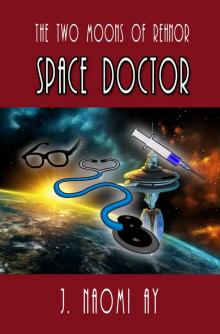 Space Doctor (The Two Moons of Rehnor)
Space Doctor (The Two Moons of Rehnor)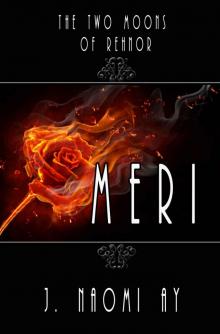 Meri (The Two Moons of Rehnor)
Meri (The Two Moons of Rehnor) The Choice (The Two Moons of Rehnor, Book 8)
The Choice (The Two Moons of Rehnor, Book 8)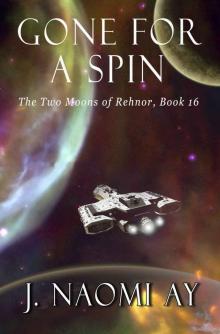 Gone for a Spin (The Two Moons of Rehnor, Book 16)
Gone for a Spin (The Two Moons of Rehnor, Book 16)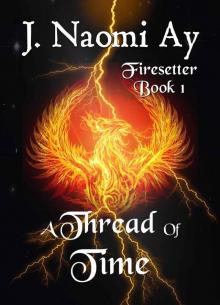 A Thread of Time: Firesetter, Book 1
A Thread of Time: Firesetter, Book 1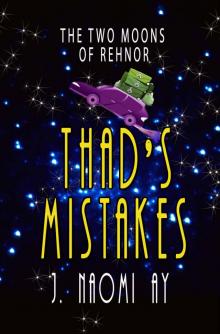 Thad's Mistakes (The Two Moons of Rehnor)
Thad's Mistakes (The Two Moons of Rehnor)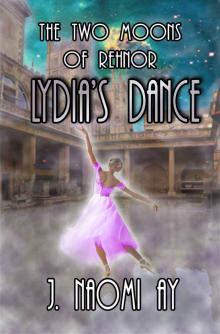 Lydia's Dance (The Two Moons of Rehnor)
Lydia's Dance (The Two Moons of Rehnor)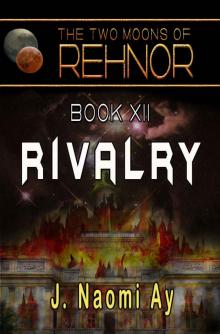 Rivalry (The Two Moons of Rehnor, Book 12)
Rivalry (The Two Moons of Rehnor, Book 12) Big Red (The Two Moons of Rehnor)
Big Red (The Two Moons of Rehnor) Shrotru: Departure Episode 2 (Journey to Rehnor)
Shrotru: Departure Episode 2 (Journey to Rehnor) Space Chase (The Two Moons of Rehnor, Book 10)
Space Chase (The Two Moons of Rehnor, Book 10)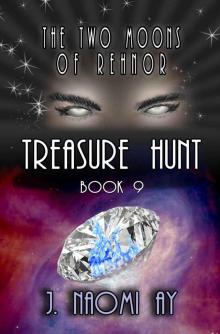 Treasure Hunt (The Two Moons of Rehnor, Book 9)
Treasure Hunt (The Two Moons of Rehnor, Book 9)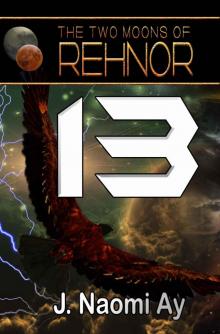 Thirteen (The Two Moons of Rehnor, Book 13)
Thirteen (The Two Moons of Rehnor, Book 13)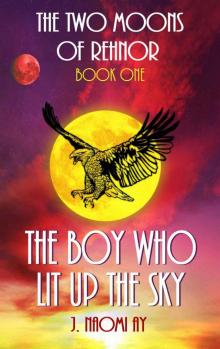 The Boy who Lit up the Sky (The Two Moons of Rehnor)
The Boy who Lit up the Sky (The Two Moons of Rehnor)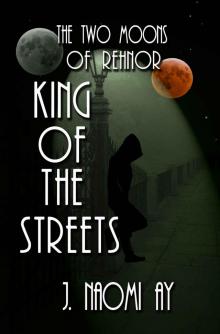 King of the Streets (The Two Moons of Rehnor)
King of the Streets (The Two Moons of Rehnor)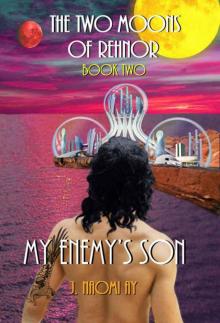 My Enemy's Son (The Two Moons of Rehnor, Book 2)
My Enemy's Son (The Two Moons of Rehnor, Book 2)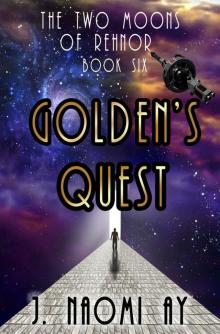 Golden's Quest (The Two Moons of Rehnor, Book 6)
Golden's Quest (The Two Moons of Rehnor, Book 6) Mike v2.0 (A Firesetter Short Story)
Mike v2.0 (A Firesetter Short Story)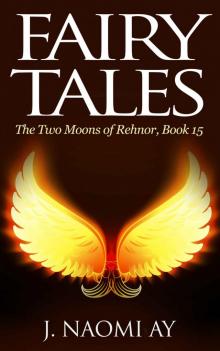 Fairy Tales (The Two Moons of Rehnor, Book 15)
Fairy Tales (The Two Moons of Rehnor, Book 15) The Days of the Golden Moons (The Two Moons of Rehnor, Book 5)
The Days of the Golden Moons (The Two Moons of Rehnor, Book 5)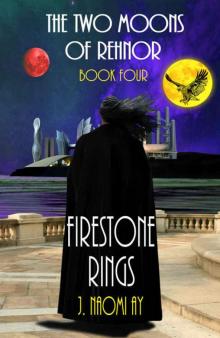 Firestone Rings (The Two Moons of Rehnor, Book 4)
Firestone Rings (The Two Moons of Rehnor, Book 4) Kudisha Departure Episode 1 Journey to Rehnor series
Kudisha Departure Episode 1 Journey to Rehnor series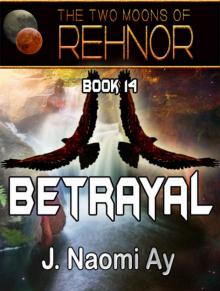 Betrayal (The Two Moons of Rehnor, Book 14)
Betrayal (The Two Moons of Rehnor, Book 14)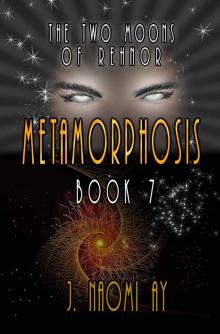 Metamorphosis (The Two Moons of Rehnor, Book 7)
Metamorphosis (The Two Moons of Rehnor, Book 7) Diridan's Daughter (The Two Moons of Rehnor)
Diridan's Daughter (The Two Moons of Rehnor)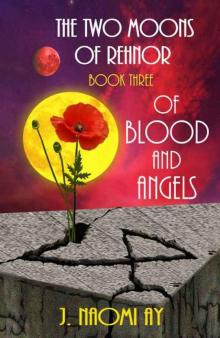 Of Blood and Angels (The Two Moons of Rehnor, Book 3)
Of Blood and Angels (The Two Moons of Rehnor, Book 3)